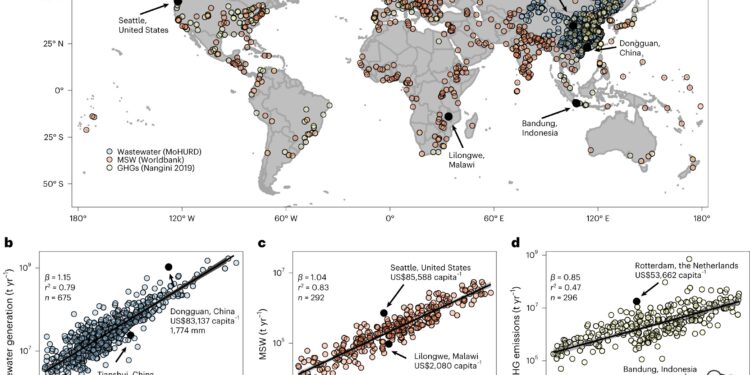Change the law on waste production in cities around the world. Credit: Nature Cities (2024). DOI: 10.1038/s44284-023-00021-5
Waste is a natural byproduct of life on Earth and productive human economies. Living systems have evolved to replenish waste – creatures like dung beetles fill an ecological niche by breaking down the excrement of other organisms – but waste is a problem that continues to plague human systems.
As the world’s population continues to grow and rapidly urbanize (two-thirds of humans will live in cities by 2050, according to the United Nations), our waste is causing a growing global crisis. Microplastics cover the planet and seep into our bodies, sewage pollutes our waterways, and greenhouse gas emissions are driving global climate change.
“As a society, we tend to ignore the unpleasant side of our production,” says Mingzhen Lu, an assistant professor at New York University and former SFI Omidyar Complexity Fellow.
Lu and SFI Professor Chris Kempes are co-corresponding authors of a paper published in Nature Cities which explores the production of waste as a function of urban systems.
“The key question is whether waste is produced more or less efficiently as systems evolve, and how large the resulting recycling burden is,” says Kempes.
To answer this question, the authors used scaling theory to analyze waste (municipal solid waste, wastewater and greenhouse gas emissions) from more than a thousand cities around the world. Scaling theory has been used in biology to describe how organismal physiology changes with body mass, and it has been shown to be relevant to understanding how waste production scales with the growth of ‘a town.
“Scaling theory allowed us to extract general patterns and transcend the individuality of each city,” says Lu.
The resulting models show distinct differences in waste generation as cities grow. Solid waste evolves in a linear manner: because it is linked to individual consumption, it increases at the same rate as population growth. On the other hand, wastewater production evolves in a superlinear manner while emissions evolve in a sublinear manner.
In other words, large cities generate disproportionately more liquid waste than small cities, but emit fewer greenhouse gases. The results suggest an economy of scale for emissions, as growth generally leads to more efficient energy and transportation infrastructure, but a diseconomy for liquid waste.
Cities tend to deviate from the universal scaling law as they become richer. Cities with higher GDP per capita generate more waste, underscoring the relationship between waste generation and economic growth.
The findings highlight the need for new waste science that can help predict the future state of urban ecosystems and inform policies to reduce waste and improve sustainability.
“Mushrooms figured out how to break down lignin waste from trees and created sustainable ecosystems that lasted hundreds of millions of years,” says Lu. “We collect it and throw it away. We can no longer ignore the waste from our societies.”
More information:
Mingzhen Lu et al, Global scale of waste generation in urban systems, Nature Cities (2024). DOI: 10.1038/s44284-023-00021-5
Provided by the Santa Fe Institute
Quote: Scaling theory approach can offer framework for reducing waste and pursuing a more sustainable future (January 18, 2024) retrieved January 18, 2024 from
This document is subject to copyright. Apart from fair use for private study or research purposes, no part may be reproduced without written permission. The content is provided for information only.



